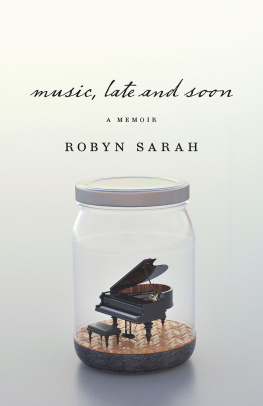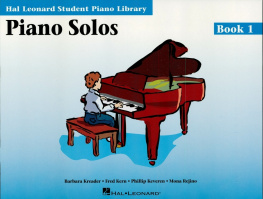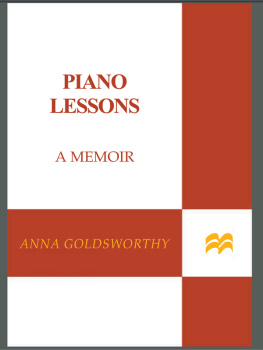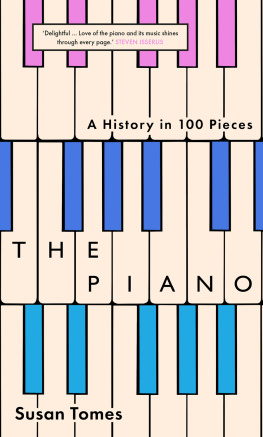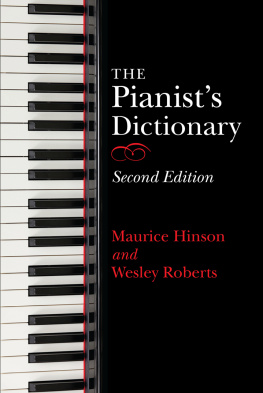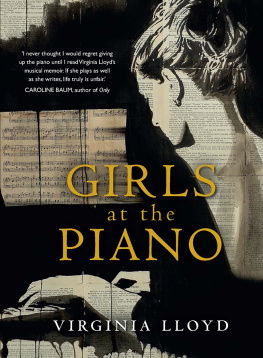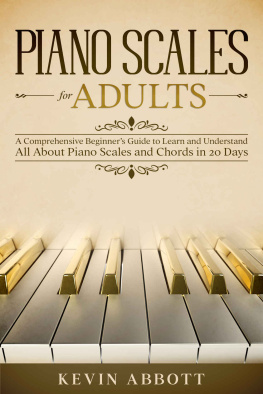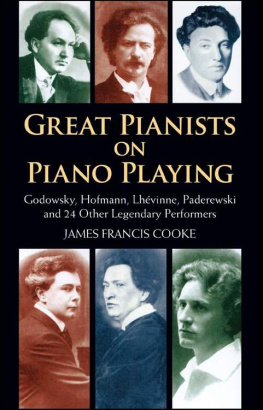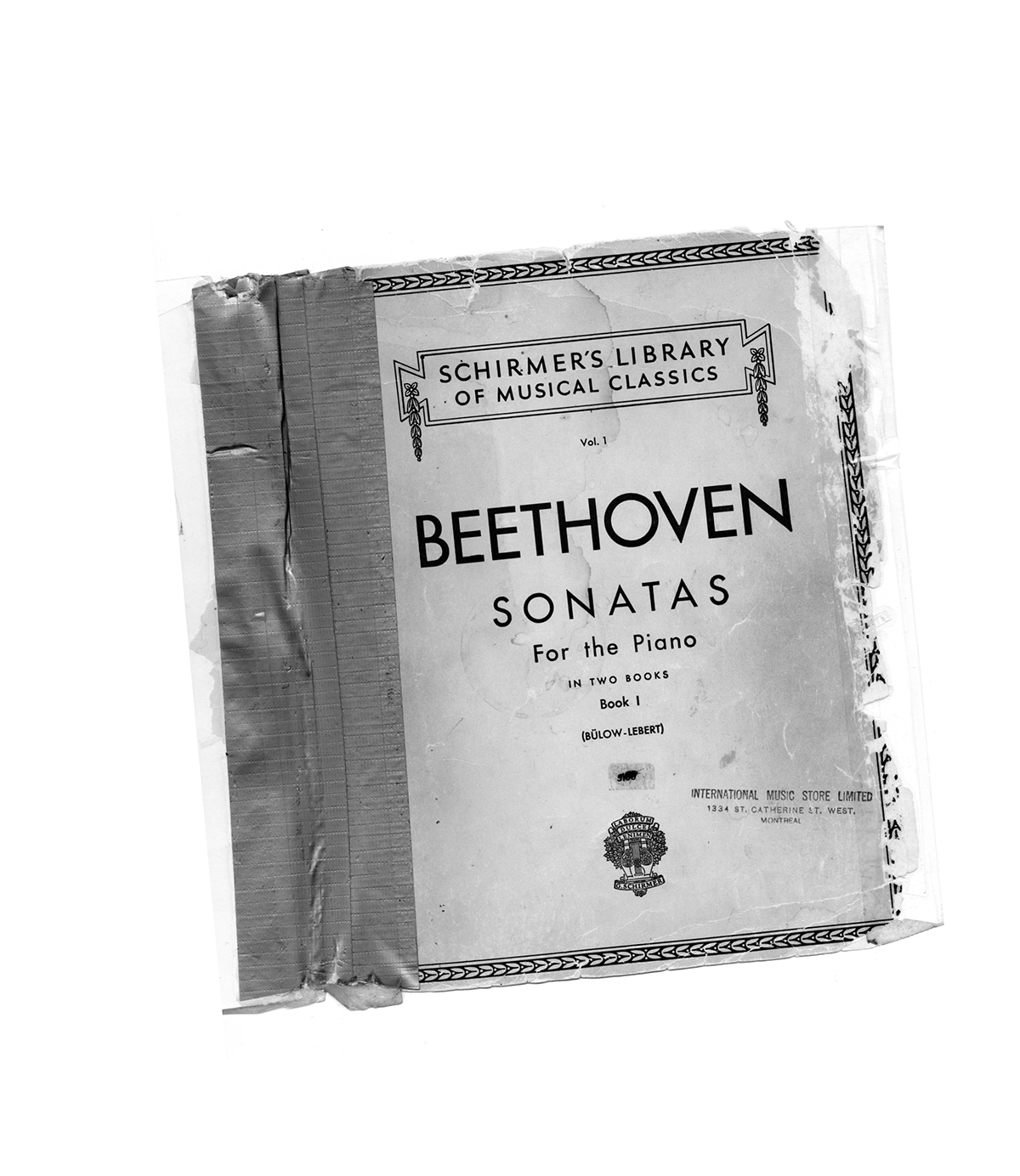Early in life, at the hands of an unworldly music teacher, I learned that there are worlds within this world. I found one in musica pursuit that replenished my powers instead of wasting them, a bulwark against the hustle of getting and spending. Late in life, I found it again.
I
Beginnings
Prelude: The Idea
I was late for my piano lesson. Thirty-five years late, to be exact. I stood at the bus stop in the mild end-of-winter sunshine casting anxious glances at my watchfurious at myself for not leaving the house earlier, making no allowance for missed buses, late buses, slow traffic. Such an auspicious moment and here I was, off to a bad start. I wanted to arrive serene and composed, not frazzled and sweaty, for my first piano lesson in three and a half decades.
Dont you feel like a little kid? my sister had asked me when I told her what I was doing that afternoon. On the bus, contemplating my pile of piano books with their frayed covers, loose bindings, and yellowing pages, I thought about that. Did I feel like a kid? Were piano lessons a kid thing? What I was doing felt quite natural and familiar; also, deeply improbable and a bit scary. Do I even remember what a piano lesson is? How will it feel to play for a strangers ears, knowledgeable earsand to play for a teacher Ive never metafter all of this time playing for my own ears, at home, in my slippers? Am I ready to re-enter this world? Is it a little crazy? I was fifty-nine years old. Something was driving me.
In due course I turned up the front walk of a modest townhouse whose address matched the one I had pencilled on a Post-It Note stuck to the cover of my old Schirmers Beethoven Sonatas. It was on a quiet, block-long street tucked away from the traffic and noise of major arteries. In the front yard, crocuses were pushing up through the melting snow. I rang the doorbell, feeling an odd mixture of trepidation and recklessness. From a distance I could hear the shouts of kids at recess in the playground of the primary school down the blocka school my grown children had once attended. Pieces of my past were colliding.
The woman who came to the door was petite, attractive, around ten years my junior. Waving away my apologies for being late, she showed me into what would have been the dining room had it not been taken over almost completely by a Steinway baby grand. Her demeanour was gracious, alert, and inquisitive. We knew next to nothing about each other, but had spoken, briefly, on the phone to arrange this first meeting. We had studied with the same teacher, though not during the same years; she came recommended by him. She had made her life in music, while I had lapsed, early on, and taken a different path. And now, here we were.
Well, here I am, I said, more gamely than I felt. I come to you with my chapped hands, my raggedy piano books, and my hopeful heart. And so began a new page in my lifea page that is still unfolding.
What made you decide to take piano lessons again? people have been asking me since. In the same period, the question I have asked myself is Why did it take me so long? Lurking beneath that is another question, Why did I stop in the first place?and this last, I know I am not alone in asking. The world is full of lapsed pianists who wish they hadnt. Three real questions, not one of which has a simple answer. I can only address them by tracking a very individual musical journey. Human stories are complicated. This is a human story.
~
In January of 1968, when I performed as guest soloist with the Montreal Symphony Orchestra in a concert series featuring young artists, my performance was not on piano. I was eighteen, a fifth-year student at Quebecs Conservatoire de musique et dart dramatique, majoring in clarinet while also a philosophy major at McGill. The Matine Symphonique at which I played a movement of Mozarts clarinet concerto was in Ottawaconvenient for my family, who had moved there from Montreal while I was finishing high school, leaving me in care of my grandparents so I could graduate with my class and continue my musical studies. The previous March, I had performed on clarinet in the Sarah Fischer recital series at the Ritz-Carlton in Montreal (sharing the programas I was surprised to note recently on unearthing a yellowed newspaper reviewwith celebrated pianist Andr Laplante, also then seventeen). Together these two events constituted my musical debutstandard first steps, in Montreal at the time, for a young professional-track musician. For such I had somehow, willy-nilly, become.
Performing as soloist with the MSO, a professional orchestra, should have been major for mea milestone moment. I dont remember it that way. The event was coloured by disappointment from the start, with my matine scheduled, anomalously, in Ottawa. Montreal had a dazzling new concert hall; Ottawas National Arts Centre was in its last year at the old Capitol Theatre, a venue designed for cinema and vaudeville. I would miss out on the thrill of playing in Place des Arts. And all my friends were in Montreal.
In a daze of nerves through the performance itself, I came off stage with a palpable sense of letdown, hyper-aware of every glitch, every passage that hadnt come off as well as it could have. It felt like a missed chance. In the wings, my parents and excited younger siblings were waiting, unaware that I had not given the performance Id hoped to. Also waiting were a photographer and a female arts reporter from the Ottawa Journal, who wanted to talk about my studies in philosophy, my prospects as a woman wind playerthings that struck me as irrelevant to the moment, prompting irrelevancies in reply. Soon after, in company of the orchestra, I boarded a train to return to Montreal. The symphony musicians, in those years nearly all men, settled down with newspaper sports sections and decks of cards; some dozed off. This was all in a days work for them. No one seemed interested in engaging with the clarinet soloist, whose moment in the sun seemed to be over.
Fidgety in my seat as the train lurched homeward, I hatched an idea for a short story I could write: a deeply conflicted young musician realizes, in the immediate aftermath of her debut, that she cannot continue on this path. Suddenly, with a stab of grief, she knows that her debut will prove to be her swan song. I saw I could use some of the details of the train ride; the character could have this flash insight on the train. Of course the story wasnt about me, I reassured myself; I was only stepping into this characters shoes. I was committed to a life in music. I had been playing principal clarinet in the Conservatoire Orchestra since the age of fifteen, a position conferred on me after a mere two years on the instrument. There would be many more chances to perform as soloist with an orchestra, and they would be different.
Was I fooling myself, or was I prescient? Though I continued on the path for another four yearslong enough to graduate from the Conservatoire with a Concours

